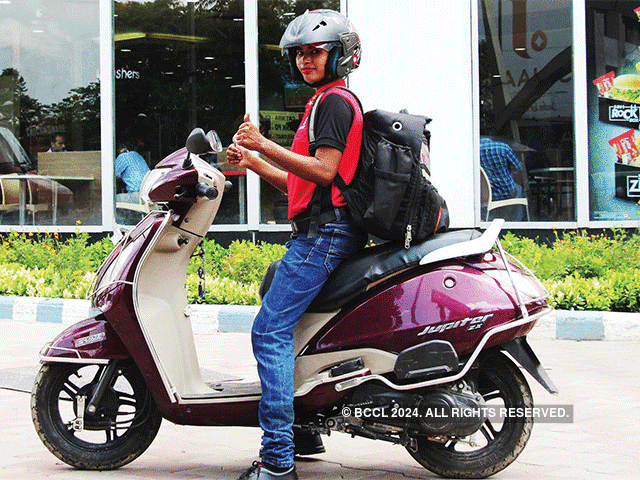 Naveen Shetty spends much of his day teaching Bollywood dance to schoolchildren in the Red Hill locality of Mangalore. But when not demonstrating latkas and jhatkas, Naveen sir’ is delivering parcels at nearby homes. The 30-year-old instructor doubles up as a delivery man for an online retailer. “The bills of my dance studio amount to Rs 22,000 per month. I don’t make enough to cover these costs. So, I decided to deliver parcels in my free hours to earn extra,” says Shetty who has bought new equipment for his studio and shoes for his students since he started doing deliveries for Myntra six months ago.
Naveen Shetty spends much of his day teaching Bollywood dance to schoolchildren in the Red Hill locality of Mangalore. But when not demonstrating latkas and jhatkas, Naveen sir’ is delivering parcels at nearby homes. The 30-year-old instructor doubles up as a delivery man for an online retailer. “The bills of my dance studio amount to Rs 22,000 per month. I don’t make enough to cover these costs. So, I decided to deliver parcels in my free hours to earn extra,” says Shetty who has bought new equipment for his studio and shoes for his students since he started doing deliveries for Myntra six months ago.For the past two years, Sona Manoj has been freelancing for Amazon India, delivering 50 packages a day, as well as running her own store, Balaji Electrical in Chennai. She recently bought a house.
‘Last-mile delivery’ is a key factor in the success of an ecommerce platform. According to industry estimates, 37% of shoppers who face delivery delays never shop with the retailer again. Roping in neighbourhood freelancers and local mom-n-pop shops is one way for firms to speed up deliveries.
Myntra calls it the Kirana Model of delivery — the e-tailer has partnered with smallbusiness owners in 90 cities across India. “We are delivering 60% of all our orders through this system. The model works especially well during peak events such as our biannual, ‘End of Reason Sale’, enabling us to deliver products 27% faster around the sale period,” says a company spokesperson.
Amazon India’s I Have Space programme partners with 20,000 local retailers across 350 cities to deliver products to customers within a 2-4km radius of their store. Flipkart and Grofers too have similar models that tap into a network of small businesses and stores.
Delivering parcels won’t make anyone a fortune but for people like Maria Tony, 52, it can be a help. Tony, who lives in Secunderabad’s Old Bowenpally area, was struggling to finance her two sons’ college education — one of them is studying mass communication and the other wants to become a professional basketball player. The family’s only source of income was their general store where Tony would work the entire day and still not manage to save enough. Then last year around Diwali, a friend suggested a parttime gig with Myntra which brings in an extra Rs 10,000 every month.
“I go around on my Activa scooty and finish delivering boxes in about four hours. Then I sit in the shop,” says Tony, who sometimes ends up working Sundays as well. She doesn’t mind the extra work even at her age, she says, as long as it helps her sons achieve their professional goals.
It’s the same goal that motivated T G Deepak to sign up. To help his daughter to make it to engineering college, the Bengaluru tailor is out making deliveries from 11am to 4pm everyday. Evenings are spent making ladies’ garments. “I used to earn Rs 1,000 to Rs 2,000 a day from my shop. But now there’s a lot of competition in tailoring and I make only Rs 800-1,000,” says the 45-year-old, who also advertises himself on his delivery rounds. “If a lady opens the door to receive the parcel, I tell her about my shop. I have managed to get new customers like this,” says Deepak.
The advantage with local entrepreneurs is that know their area well and enjoy goodwill in their neighbourhood.
Firms say there’s a criteria for selecting delivery partners: cleanliness and hygiene of the shop, easy vehicular accessibility to the store, a good understanding of the area and basic education to handle communication with customers. They also undergo a two-day training session.
For 30-year-old PhD aspirant Praveen Kumar, a freelance delivery gig is an easy way to earn money while studying. “Earlier I used to give tuitions but it wasn’t paying. I started looking for a part-time job in a private company but couldn’t find anything. So, when this opportunity came my way I grabbed it,” says Kumar who lives in Dilshad Garden, Delhi. Kumar, who has an MA from IGNOU and an LLB from Chaudhary Charan Singh University, says that until recently he wanted to become a college lecturer. “But now I think delivering e-commerce goods is easier and pays more. So now I want to open my own delivery firm,” says Kumar.
Very nice blog. It is very useful for us. Thanks for good information. Kindly visit our site below.
ReplyDeletepattern making software
tailor made software
Such a wonderful article shared by you. Thanks for sharing this kind of stuff. Run your retail business more successfully with Direct Store Delivery (DSD) Solutions. For more direct store delivery companies
ReplyDelete